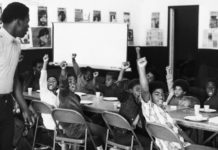For the last 10 years, New Orleans has played the blame game in education.
Reformers have shamed the past to argue for change. In return, reform has been charged with destroying public education for future children. The aftermath of Katrina should have incited passions. However, everyone seems to have profited from the debate except for public school families—the people who need more than just words.
Durable arguments have concretized into an immovable tableau that gets in the way of both justice and progress. Regardless of whose side you’re on, pointing fingers to say who did what to who doesn’t solve problems. Progress forces us to ask where do we go from here.
Don’t get me wrong—we have to reflect. More than 1500 people from the region died. Thousands were not given an opportunity to rebuild and recover as hundreds of public housing units were shuttered. Teachers lost their jobs en masse, and as a consequence, they lost their livelihoods. We must pay our respects.
Still, the commemoration of the 10-year anniversary of Katrina should be less about the last 10 years and more about the next 10. New Orleanians live with storms. Opportunities for correction will come, again. Consequently, where do we go from here?
Looking forward isn’t a cowardly way out of accepting responsibility for past behavior. Looking into the future is no less contentious or challenging. If we authentically work toward a vision for public schools with justice in mind, we have to face our current shortcomings. Yes, we will need reform because systems 10 years from now shouldn’t look the same as they do today.
Nevertheless, reporters, cynics and advocates will compel us to rehash the past. New Orleanians must see beyond those agendas that seek to leverage where we have been already. The anniversary must primarily be for members of the community. Last month, at a national charter schools conference held here in New Orleans, Michael Smithers of New Schools New Orleans said, “We need to start authentically engaging communities and stop treating them as separate from the reform movement.”
Inclusion must be a primary focus in the next 10. I’m not talking about having reform groups simply reproduce the diversity of a beer commercial. I’m talking about hearing and responding to new voices. Likewise, we need to find new ways to conduct meetings and engage and/or participate with the educational boards that control our schools.
We need to hear from you, New Orleans.
Submit your suggestions for inclusive reform to The Second Line Education Blogand/or tweet using the hashtags #Katrina #Next10.
Let Smithers tell you himself:










